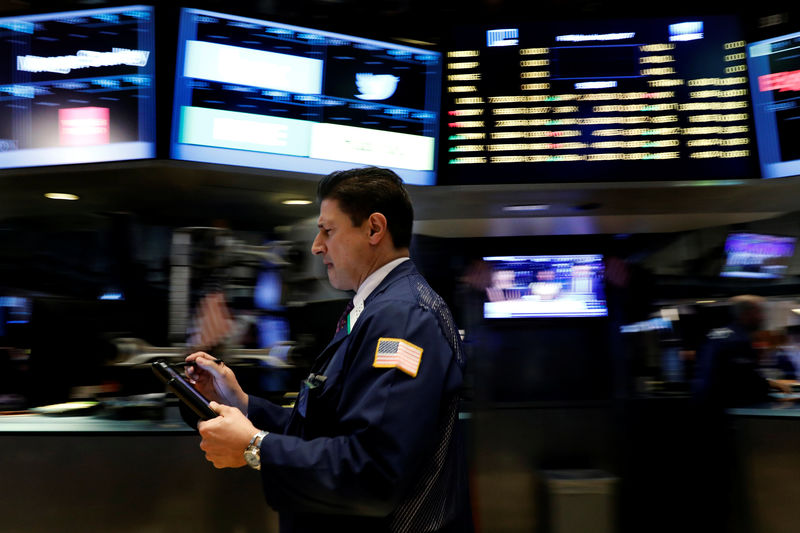By Hilary Russ
NEW YORK (Reuters) - World equity markets fell with oil prices on Monday amid concerns a diplomatic rift among some key Middle Eastern energy producers may weaken a pact on output cuts, and the U.S. dollar rebounded from a near seven-month low against the euro.
Sterling firmed as investors focused on the impending British election, while Friday's disappointing U.S. employment report initially lifted gold prices to a six-week high and boosted Treasury yields as investors booked profit.
"We had a pretty significant reaction to payrolls, which was a little overdone," said Bruno Braizinha, interest rates strategist at Societe Generale (PA:SOGN) in New York.
The data initially pushed gold
But gold retreated and was last down slightly at $1,278. Even so, markets signaled they expected the U.S. Federal Reserve to raise interest rates next week.
Key U.S. stock indexes were little changed to lower as investors mostly shrugged off weekend attacks in London and after Arab states cut ties with Qatar over alleged support for Islamist and Iran.
The Dow Jones Industrial Average (DJI) fell 7.67 points, or 0.04 percent, to 21,198.62, the S&P 500 (SPX) lost 1.34 points, or 0.05 percent, to 2,437.73 and the Nasdaq Composite (IXIC) dropped 4.89 points, or 0.08 percent, to 6,300.91.
Apple (O:AAPL) also weighed on all the three major indexes following a rating cut and ahead of its developer conference.
The pan-European FTSEurofirst 300 index (FTEU3) lost 0.13 percent and MSCI's gauge of stocks across the globe (MIWD00000PUS) shed 0.10 percent.
In the Middle East, Qatar's main stock index (QSI) fell more than 7 percent. Saudi Arabia - the world's biggest crude oil exporter - the United Arab Emirates, Egypt and Bahrain cut ties with Qatar, accusing the Gulf Arab state of supporting terrorism.
Qatar is the world's biggest supplier of liquefied natural gas (LNG) and a major supplier of condensate.
Brent crude oil (LCOc1), the international benchmark, rose more than 1 percent at one point, recouping some of last week's 4 percent losses, but turned tails to drop back below $50 a barrel.
It was last at $49.46, down 0.98 percent on the day, with U.S. crude (CLc1) settling 0.55, or 26 cents, lower at $47.40 per barrel.
"I think it's still going to be a bit of a debate on the true impact it can have on the oil market," said Olivier Jakob, strategist at Petromatrix, adding that a breakdown in relations between Qatar and Saudi Arabia could hamper an OPEC-led deal on production cuts.
Britain's pound
Prime Minister Theresa May said Thursday's election would go ahead. Opinion polls in the past week have put her Conservatives ahead, though with a narrowing lead over the Labour opposition.
"Even if May does just about enough to increase the majority - that could still potentially be sterling positive," said ING currency strategist Viraj Patel.
The dollar index (DXY) rose 0.08 percent, having hit its lowest since Nov. 9 after Friday's U.S. jobs report, and rebounded against the euro as traders doubted any European Central Bank shift in policy stance could strengthen the euro further.
European Central Bank policymakers meet this week. They are expected to take a more benign view of the euro zone economy and discuss dropping pledges to ramp up economic stimulus if needed, sources with direct knowledge of the discussions told Reuters last week.
The euro

For Reuters Live Markets blog on European and UK stock markets see reuters://realtime/verb=Open/url=http://emea1.apps.cp.extranet.thomsonreuters.biz/cms/?pageId=livemarkets